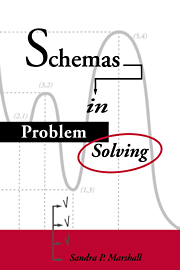I - Fundamentals
Published online by Cambridge University Press: 22 October 2009
Summary
The three chapters in part I present my view of the integral formulation of schema development and usage in problem solving. These chapters provide an overview of the historical importance of the schema, review contributions from various disciplines, lay out the basic theory that guides the research presented in this book, and describe the specific schemas that are the focus of the research reported in later chapters. A central goal of part I is the formulation of an operational definition of a schema. The word schema is widely used, it often appears with little or no definition, and it frequently takes on a slightly different meaning for every researcher who uses it. In part I, I describe very specifically what I mean when I use the term schema.
Chapter 1 looks at the history and meaning of the term schema. It summarizes how schemas have been defined and described, beginning with ancient Greek philosophy and closing with modern cognitive science. Most striking is the extent of our debt to the ancient Greeks. Many of our current debates have roots in their philosophical discussions.
- Type
- Chapter
- Information
- Schemas in Problem Solving , pp. 1 - 2Publisher: Cambridge University PressPrint publication year: 1995



